中国传统文化经典名人故事【中英对照】
- 格式:doc
- 大小:46.00 KB
- 文档页数:3
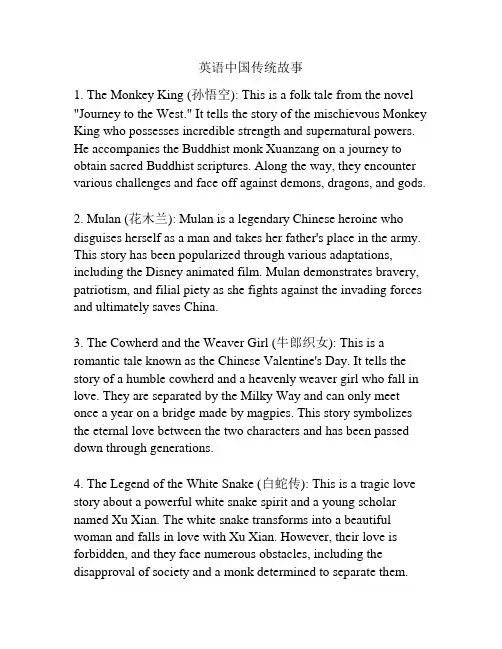
英语中国传统故事1. The Monkey King (孙悟空): This is a folk tale from the novel "Journey to the West." It tells the story of the mischievous Monkey King who possesses incredible strength and supernatural powers. He accompanies the Buddhist monk Xuanzang on a journey to obtain sacred Buddhist scriptures. Along the way, they encounter various challenges and face off against demons, dragons, and gods.2. Mulan (花木兰): Mulan is a legendary Chinese heroine who disguises herself as a man and takes her father's place in the army. This story has been popularized through various adaptations, including the Disney animated film. Mulan demonstrates bravery, patriotism, and filial piety as she fights against the invading forces and ultimately saves China.3. The Cowherd and the Weaver Girl (牛郎织女): This is a romantic tale known as the Chinese Valentine's Day. It tells the story of a humble cowherd and a heavenly weaver girl who fall in love. They are separated by the Milky Way and can only meet once a year on a bridge made by magpies. This story symbolizes the eternal love between the two characters and has been passed down through generations.4. The Legend of the White Snake (白蛇传): This is a tragic love story about a powerful white snake spirit and a young scholar named Xu Xian. The white snake transforms into a beautiful woman and falls in love with Xu Xian. However, their love is forbidden, and they face numerous obstacles, including the disapproval of society and a monk determined to separate them.5. The Eight Immortals (八仙): The Eight Immortals is a folklore group of mythical characters in Chinese mythology. Each character possesses unique skills or abilities and represents a different virtue or power. The stories surrounding the Eight Immortals often depict their adventures and encounters with other legendary beings. They are revered as immortals who bring happiness, fortune, and longevity.These are just a few examples of traditional Chinese stories. Chinese culture has a rich heritage of folklore, mythical creatures, and legendary figures that continue to inspire and entertain people worldwide.。
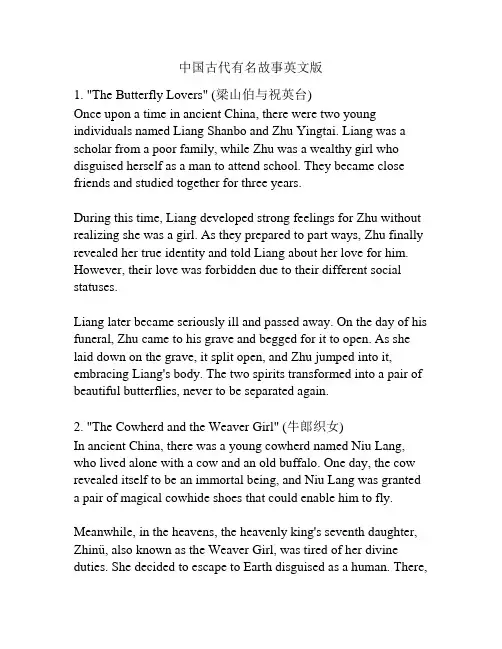
中国古代有名故事英文版1. "The Butterfly Lovers" (梁山伯与祝英台)Once upon a time in ancient China, there were two young individuals named Liang Shanbo and Zhu Yingtai. Liang was a scholar from a poor family, while Zhu was a wealthy girl who disguised herself as a man to attend school. They became close friends and studied together for three years.During this time, Liang developed strong feelings for Zhu without realizing she was a girl. As they prepared to part ways, Zhu finally revealed her true identity and told Liang about her love for him. However, their love was forbidden due to their different social statuses.Liang later became seriously ill and passed away. On the day of his funeral, Zhu came to his grave and begged for it to open. As she laid down on the grave, it split open, and Zhu jumped into it, embracing Liang's body. The two spirits transformed into a pair of beautiful butterflies, never to be separated again.2. "The Cowherd and the Weaver Girl" (牛郎织女)In ancient China, there was a young cowherd named Niu Lang, who lived alone with a cow and an old buffalo. One day, the cow revealed itself to be an immortal being, and Niu Lang was granted a pair of magical cowhide shoes that could enable him to fly. Meanwhile, in the heavens, the heavenly king's seventh daughter, Zhinü, also known as the Weaver Girl, was tired of her divine duties. She decided to escape to Earth disguised as a human. There,she met Niu Lang, and they fell deeply in love. They got married and had two children.However, when the heavenly king discovered Zhinü's escape, he was enraged. He ordered his soldiers to bring her back to the heavens, but Niu Lang was determined to follow her. With the help of his magical cowhide shoes, Niu Lang chased after the soldiers.The heavenly king, moved by their love, allowed them to meet once a year on the seventh day of the seventh lunar month. On this day, magpies form a bridge across the Milky Way to reunite the Cowherd and the Weaver Girl, symbolizing their eternal love.3. "Journey to the West" (西游记)"Journey to the West" is a famous Chinese novel written during the Ming Dynasty. It tells the story of a Buddhist monk named Xuanzang and his disciples' journey to retrieve sacred Buddhist scriptures from India.The monk, accompanied by three infamous disciples – Sun Wukong, the Monkey King; Zhu Bajie, the pig demon; and Sha Wujing, a reformed river ogre – faces numerous challenges and battles against various demons and mythical creatures along the way.Throughout their treacherous journey, the monk and his disciples learn valuable lessons about friendship, loyalty, and personal growth. They overcome their flaws and become true heroes, contributing to the spread of Buddhism in China.These are just a few of the many beloved ancient Chinese stories. Each tale teaches important morals and values while capturing the cultural essence of ancient China.。
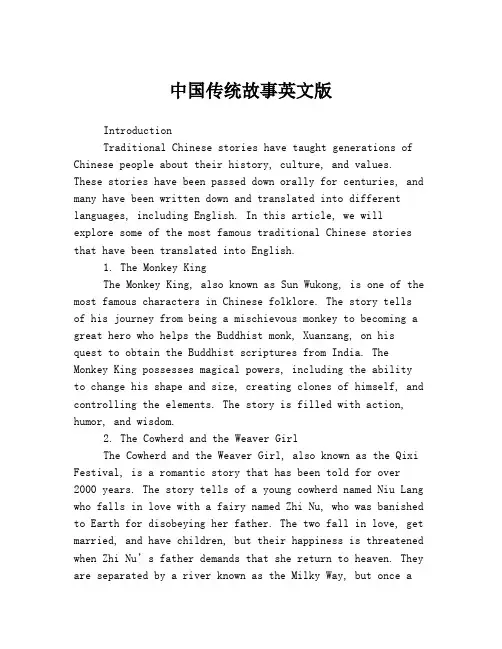
中国传统故事英文版IntroductionTraditional Chinese stories have taught generations of Chinese people about their history, culture, and values. These stories have been passed down orally for centuries, and many have been written down and translated into different languages, including English. In this article, we will explore some of the most famous traditional Chinese stories that have been translated into English.1. The Monkey KingThe Monkey King, also known as Sun Wukong, is one of the most famous characters in Chinese folklore. The story tellsof his journey from being a mischievous monkey to becoming a great hero who helps the Buddhist monk, Xuanzang, on his quest to obtain the Buddhist scriptures from India. The Monkey King possesses magical powers, including the abilityto change his shape and size, creating clones of himself, and controlling the elements. The story is filled with action, humor, and wisdom.2. The Cowherd and the Weaver GirlThe Cowherd and the Weaver Girl, also known as the Qixi Festival, is a romantic story that has been told for over 2000 years. The story tells of a young cowherd named Niu Lang who falls in love with a fairy named Zhi Nu, who was banished to Earth for disobeying her father. The two fall in love, get married, and have children, but their happiness is threatened when Zhi Nu’s father demands that she return to heaven. They are separated by a river known as the Milky Way, but once ayear on the seventh day of the seventh lunar month, birdsform a bridge to allow them to meet.3. The Legend of the White SnakeThe Legend of the White Snake is a tragic love storythat has been told for over 1000 years. It tells of a white snake spirit who falls in love with a human man named Xu Xian. The two get married and live happily until a Buddhist monk,Fa Hai, discovers that the snake is a demon and tries to separate them. In the end, the white snake spirit is defeated and turned into a stone.4. The Eight ImmortalsThe Eight Immortals is a collection of stories that tell of eight legendary figures who have supernatural powers andare revered in Chinese culture. They are said to have helped many ordinary people in times of need. Each immortal has hisor her own unique personality, powers, and teachings. The stories are filled with humor, wisdom, and lessons.ConclusionThese traditional Chinese stories are just a few examples of the rich cultural heritage of China. They have been passed down from generation to generation and continueto inspire and entertain people all over the world. Translations into English have helped to spread these stories even further, allowing more people to appreciate the beauty and wisdom of Chinese culture.。
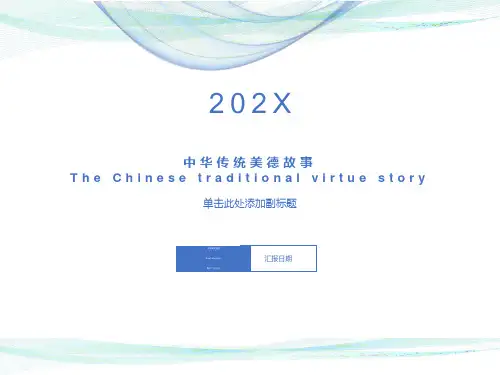
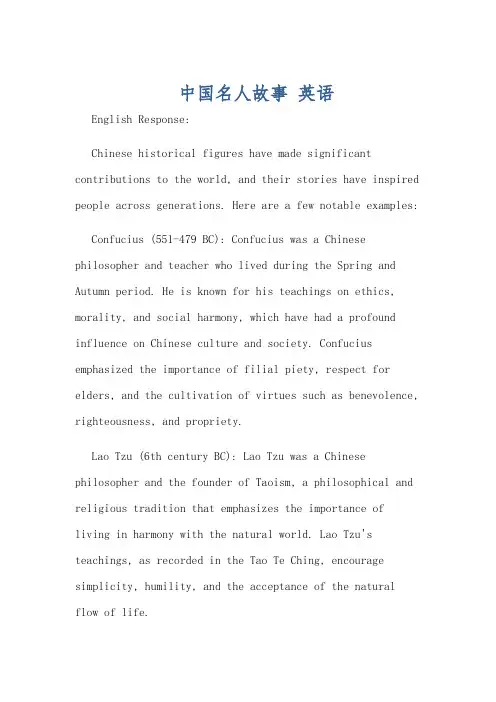
中国名人故事英语English Response:Chinese historical figures have made significant contributions to the world, and their stories have inspired people across generations. Here are a few notable examples: Confucius (551-479 BC): Confucius was a Chinese philosopher and teacher who lived during the Spring and Autumn period. He is known for his teachings on ethics, morality, and social harmony, which have had a profound influence on Chinese culture and society. Confucius emphasized the importance of filial piety, respect for elders, and the cultivation of virtues such as benevolence, righteousness, and propriety.Lao Tzu (6th century BC): Lao Tzu was a Chinese philosopher and the founder of Taoism, a philosophical and religious tradition that emphasizes the importance ofliving in harmony with the natural world. Lao Tzu's teachings, as recorded in the Tao Te Ching, encourage simplicity, humility, and the acceptance of the natural flow of life.Sun Tzu (6th century BC): Sun Tzu was a Chinese military strategist and philosopher who lived during the Spring and Autumn period. He is the author of the renowned treatise on military strategy, "The Art of War," which has been studied and applied in various fields, from business tointernational relations.Empress Wu Zetian (624-705 AD): Empress Wu Zetian wasthe only female emperor in Chinese history. She rose to power during the Tang Dynasty and is known for herpolitical acumen, administrative reforms, and the expansion of Buddhism during her reign.Zheng He (1371-1433 AD): Zheng He was a Chinese explorer and fleet admiral who led a series of voyages across the Indian Ocean, reaching as far as Africa and the Middle East. His expeditions were a testament to China's naval power and technological advancements during the Ming Dynasty.中文回应:中国历史上众多杰出人物的故事启发和影响了世界各地的人们。
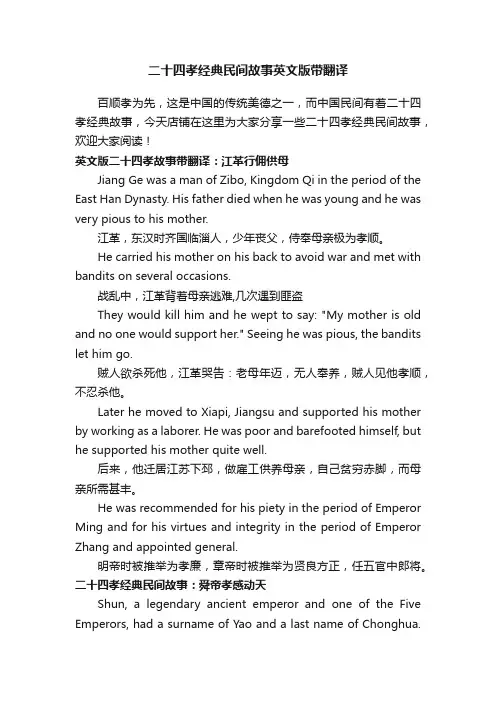
二十四孝经典民间故事英文版带翻译百顺孝为先,这是中国的传统美德之一,而中国民间有着二十四孝经典故事,今天店铺在这里为大家分享一些二十四孝经典民间故事,欢迎大家阅读!英文版二十四孝故事带翻译:江革行佣供母Jiang Ge was a man of Zibo, Kingdom Qi in the period of the East Han Dynasty. His father died when he was young and he was very pious to his mother.江革,东汉时齐国临淄人,少年丧父,侍奉母亲极为孝顺。
He carried his mother on his back to avoid war and met with bandits on several occasions.战乱中,江革背着母亲逃难,几次遇到匪盗They would kill him and he wept to say: "My mother is old and no one would support her." Seeing he was pious, the bandits let him go.贼人欲杀死他,江革哭告:老母年迈,无人奉养,贼人见他孝顺,不忍杀他。
Later he moved to Xiapi, Jiangsu and supported his mother by working as a laborer. He was poor and barefooted himself, but he supported his mother quite well.后来,他迁居江苏下邳,做雇工供养母亲,自己贫穷赤脚,而母亲所需甚丰。
He was recommended for his piety in the period of Emperor Ming and for his virtues and integrity in the period of Emperor Zhang and appointed general.明帝时被推举为孝廉,章帝时被推举为贤良方正,任五官中郎将。
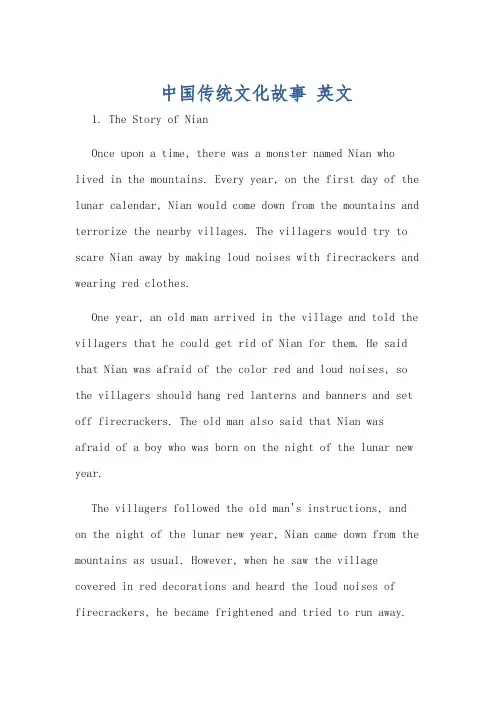
中国传统文化故事英文1. The Story of NianOnce upon a time, there was a monster named Nian who lived in the mountains. Every year, on the first day of the lunar calendar, Nian would come down from the mountains and terrorize the nearby villages. The villagers would try to scare Nian away by making loud noises with firecrackers and wearing red clothes.One year, an old man arrived in the village and told the villagers that he could get rid of Nian for them. He said that Nian was afraid of the color red and loud noises, so the villagers should hang red lanterns and banners and set off firecrackers. The old man also said that Nian wasafraid of a boy who was born on the night of the lunar new year.The villagers followed the old man's instructions, and on the night of the lunar new year, Nian came down from the mountains as usual. However, when he saw the village covered in red decorations and heard the loud noises of firecrackers, he became frightened and tried to run away.Just then, a boy who was born on the night of the lunar new year appeared. Nian was terrified of the boy and ran backup to the mountains, never to be seen again.中文版:从前,有一只叫做年兽的怪兽住在山里。
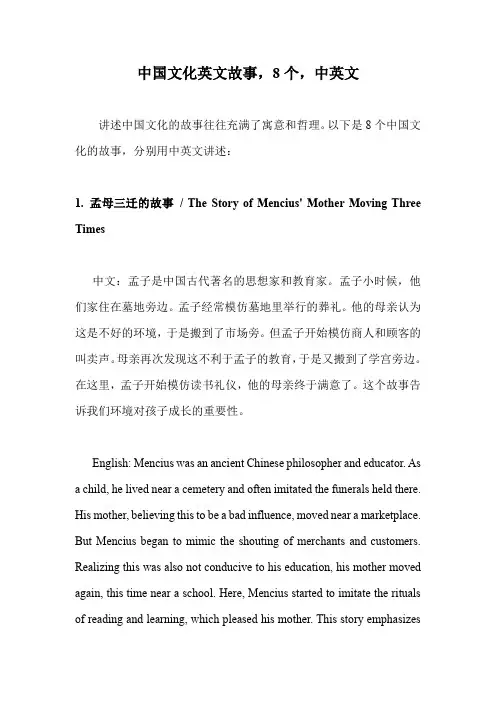
中国文化英文故事,8个,中英文讲述中国文化的故事往往充满了寓意和哲理。
以下是8个中国文化的故事,分别用中英文讲述:1. 孟母三迁的故事/ The Story of Mencius' Mother Moving Three Times中文:孟子是中国古代著名的思想家和教育家。
孟子小时候,他们家住在墓地旁边。
孟子经常模仿墓地里举行的葬礼。
他的母亲认为这是不好的环境,于是搬到了市场旁。
但孟子开始模仿商人和顾客的叫卖声。
母亲再次发现这不利于孟子的教育,于是又搬到了学宫旁边。
在这里,孟子开始模仿读书礼仪,他的母亲终于满意了。
这个故事告诉我们环境对孩子成长的重要性。
English: Mencius was an ancient Chinese philosopher and educator. As a child, he lived near a cemetery and often imitated the funerals held there. His mother, believing this to be a bad influence, moved near a marketplace. But Mencius began to mimic the shouting of merchants and customers. Realizing this was also not conducive to his education, his mother moved again, this time near a school. Here, Mencius started to imitate the rituals of reading and learning, which pleased his mother. This story emphasizesthe importance of the right environment for a child's growth.2. 守株待兔的故事/ The Story of the Man Who Waited for a Rabbit中文:这个故事讲的是一个农民在田里工作时,偶然有只兔子撞在树根上死了。
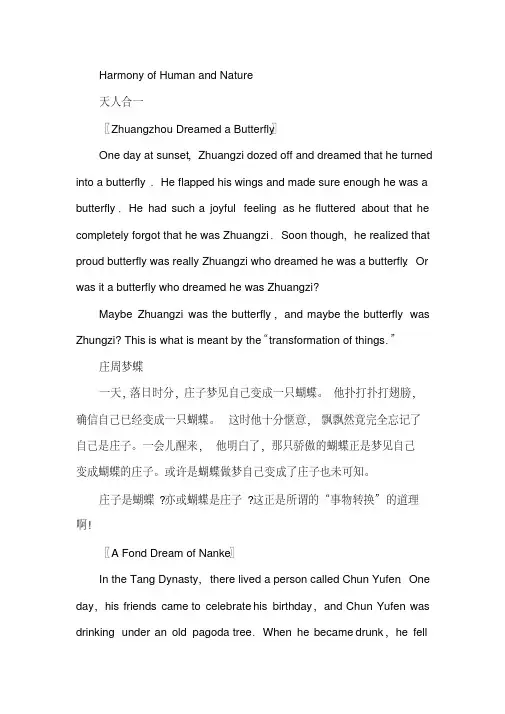
Harmony of Human and Nature天人合一〖Zhuangzhou Dreamed a Butterfly〗One day at sunset,Zhuangzi dozed off and dreamed that he turned into a butterfly.He flapped his wings and made sure enough he was a butterfly.He had such a joyful feeling as he fluttered about that he completely forgot that he was Zhuangzi.Soon though,he realized that proud butterfly was really Zhuangzi who dreamed he was a butterfly.Or was it a butterfly who dreamed he was Zhuangzi?Maybe Zhuangzi was the butterfly,and maybe the butterfly was Zhungzi? This is what is meant by the“transformation of things.”庄周梦蝶一天,落日时分,庄子梦见自己变成一只蝴蝶。
他扑打扑打翅膀,确信自己已经变成一只蝴蝶。
这时他十分惬意,飘飘然竟完全忘记了自己是庄子。
一会儿醒来,他明白了,那只骄傲的蝴蝶正是梦见自己变成蝴蝶的庄子。
或许是蝴蝶做梦自己变成了庄子也未可知。
庄子是蝴蝶?亦或蝴蝶是庄子?这正是所谓的“事物转换”的道理啊!〖A Fond Dream of Nanke〗In the Tang Dynasty,there lived a person called Chun Yufen.One day,his friends came to celebrate his birthday,and Chun Yufen was drinking under an old pagoda tree.When he became drunk,he fellasleep.Suddenly,Chun Yufen met with two atomies who took him into a giant hole in the tree,having a ride to the great Kingdom of Pagoda.Chun Yufen found himself in a fairy world with many red gates,magnificent palaces,luxuriant pavilions and beautiful gardens.南柯一梦在中国唐朝,有个人叫淳于棼。
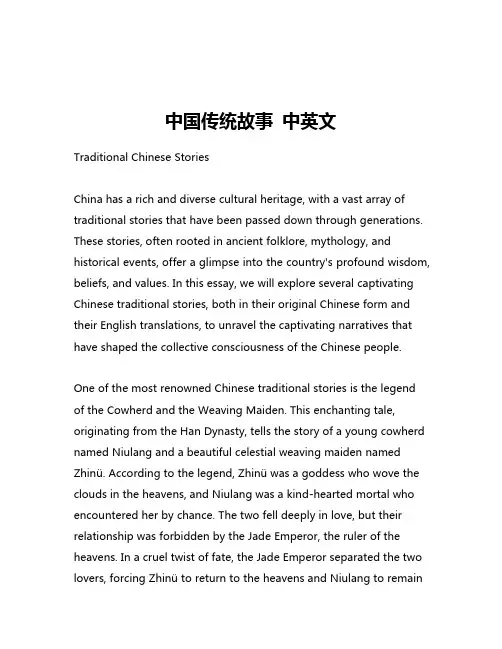
中国传统故事中英文Traditional Chinese StoriesChina has a rich and diverse cultural heritage, with a vast array of traditional stories that have been passed down through generations. These stories, often rooted in ancient folklore, mythology, and historical events, offer a glimpse into the country's profound wisdom, beliefs, and values. In this essay, we will explore several captivating Chinese traditional stories, both in their original Chinese form and their English translations, to unravel the captivating narratives that have shaped the collective consciousness of the Chinese people.One of the most renowned Chinese traditional stories is the legend of the Cowherd and the Weaving Maiden. This enchanting tale, originating from the Han Dynasty, tells the story of a young cowherd named Niulang and a beautiful celestial weaving maiden named Zhinü. According to the legend, Zhinü was a goddess who wove the clouds in the heavens, and Niulang was a kind-hearted mortal who encountered her by chance. The two fell deeply in love, but their relationship was forbidden by the Jade Emperor, the ruler of the heavens. In a cruel twist of fate, the Jade Emperor separated the two lovers, forcing Zhinü to return to the heavens and Niulang to remainon Earth. However, once a year, on the seventh day of the seventh lunar month, a flock of magpies would form a bridge across the Milky Way, allowing the two lovers to be reunited for a single day. This bittersweet tale of star-crossed lovers has captivated audiences for centuries, serving as a powerful symbol of enduring love and the resilience of the human spirit.Another iconic Chinese traditional story is the Journey to the West, also known as the Monkey King saga. This epic tale, attributed to the Ming Dynasty author Wu Cheng'en, follows the adventures of Sun Wukong, a mischievous and powerful monkey deity, and his companions as they embark on a perilous journey to the West to retrieve sacred Buddhist scriptures. Along the way, they encounter a host of fantastical creatures, celestial beings, and treacherous obstacles, all while grappling with themes of spirituality, morality, and the search for enlightenment. The story's blend of action, humor, and philosophical depth has made it a beloved classic, not only in China but around the world, inspiring numerous adaptations in film, television, and literature.Another captivating Chinese traditional story is the Legend of the White Snake, a timeless tale of forbidden love and the struggle between mortal and supernatural realms. The story centers around a beautiful snake spirit named Bai Suzhen, who transforms into a human woman and falls in love with a young scholar named Xu Xian.Their love is threatened by a Buddhist monk named Fa Hai, who seeks to expose Bai Suzhen's true nature and separate the two lovers. The story explores themes of loyalty, sacrifice, and the power of love to transcend societal boundaries and supernatural forces. The legend has been retold and reimagined countless times, captivating audiences with its poignant exploration of the human condition and the enduring nature of love.In addition to these well-known tales, China's rich literary heritage is home to a vast array of other traditional stories, each with its own unique cultural significance and captivating narrative. From the heroic exploits of the legendary general Guan Yu in the Romance of the Three Kingdoms, to the intricate court intrigues and romantic entanglements of the Dream of the Red Chamber, Chinese traditional stories offer a window into the country's deep-rooted traditions, values, and collective psyche.These stories, passed down through generations, not only entertain and captivate but also serve as a means of preserving and transmitting the cultural heritage of China. They reflect the country's diverse folklore, mythological beliefs, and historical legends, providing a glimpse into the complex tapestry of Chinese civilization. By exploring these traditional tales, both in their original Chinese form and their English translations, we can gain a deeper understanding and appreciation for the rich and multifaceted culturallegacy of China.In conclusion, Chinese traditional stories are a testament to the enduring power of storytelling and the enduring influence of a civilization that has captivated the world for millennia. From the star-crossed lovers of the Cowherd and the Weaving Maiden, to the mischievous antics of the Monkey King, these tales continue to captivate and inspire audiences across the globe, serving as a reminder of the profound wisdom, creativity, and cultural depth that lies at the heart of the Chinese tradition.。
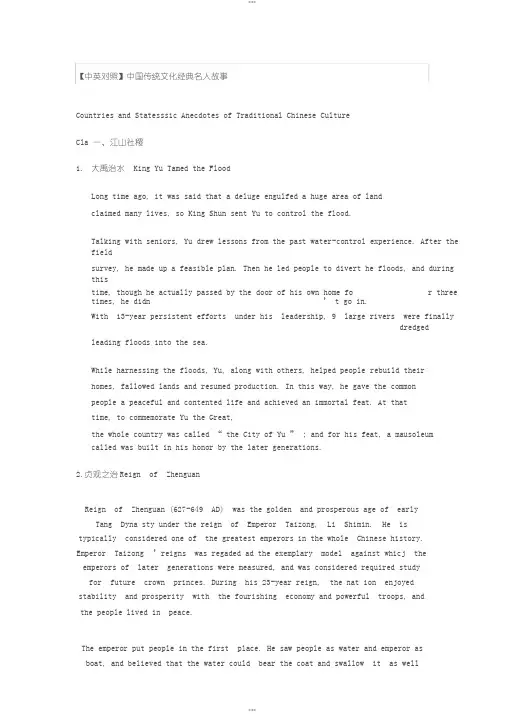
【中英对照】中国传统文化经典名人故事Countries and Statesssic Anecdotes of Traditional Chinese CultureCla 一、江山社稷1.大禹治水 King Yu Tamed the FloodLong time ago, it was said that a deluge engulfed a huge area of landclaimed many lives, so King Shun sent Yu to control the flood.Talking with seniors, Yu drew lessons from the past water-control experience. After the fieldsurvey, he made up a feasible plan. Then he led people to divert he floods, and during thistime, though he actually passed by the door of his own home fo r three times, he didn ’ t go in.With 13-year persistent efforts under his leadership, 9 large rivers were finallydredgedleading floods into the sea.While harnessing the floods, Yu, along with others, helped people rebuild theirhomes, fallowed lands and resumed production. In this way, he gave the commonpeople a peaceful and contented life and achieved an immortal feat. At thattime, to commemorate Yu the Great,the whole country was called “ the City of Yu ” ; and for his feat, a mausoleumcalled was built in his honor by the later generations.2.贞观之治Reign of ZhenguanReign of Zhenguan (627-649 AD) was the golden and prosperous age of early Tang Dyna sty under the reign of Emperor Taizong, Li Shimin. He istypically considered one of the greatest emperors in the whole Chinese history. Emperor Taizong ’reigns was regaded ad the exemplary model against whicj the emperors of later generations were measured, and was considered required studyfor future crown princes. During his 23-year reign, the nat ion enjoyedstability and prosperity with the fourishing economy and powerful troops, andthe people lived in peace.The emperor put people in the first place. He saw people as water and emperor asboat, and believed that the water could bear the coat and swallow it as well( 民,水也;君,舟也。
中国优秀传统故事文稿英文和中文中文(Chinese):中国优秀的传统故事源远流长,其中蕴含着丰富的文化内涵和智慧。
这些故事传承至今,深受人们喜爱,并在民间广泛流传。
下面将介绍一些中国优秀传统故事的相关内容。
《孔子拜访老子》孔子和老子是中国哲学史上两位非常重要的思想家。
虽然他们的思想有所差异,但是他们都为后世留下了重要的学说。
传说孔子曾去拜访老子,两位智者之间展开了一场关于道德和人生哲学的深入对话。
孔子以礼治国为出发点,强调了人与人之间的互动和善行的重要性,而老子则强调了“无为而治”和“道法自然”的观念。
这个故事展现了中国古代哲学思想的多样性和智慧,也表达了中国传统文化追求和谐的价值观念。
《白蛇传》《白蛇传》是中国传统四大民间故事之一,讲述了白蛇和许仙之间离奇的爱情故事。
故事中,白蛇化身为人形白素贞,在人间与许仙相识相爱。
但是,许仙的师傅、法海却不同意他们的婚姻。
最终,白蛇与法海展开一场神仙战争。
这个故事融合了爱情、善恶、人与神仙之间的斗争等元素,深刻揭示了人性的复杂和爱情的力量。
这个故事也成为中国文化中有关人与神仙的经典之一,其思想内涵仍然对现代社会产生着影响。
《孟母三迁》《孟母三迁》讲述了古代中国的一位母亲为了给儿子创造更好的学习环境而三次迁居的故事。
故事中,孟母知道教育对于儿子的重要性,不惜劳累,迁居多次,为儿子选择最好的学习环境。
这个故事反映了古代中国家长对于子女教育的重视和付出,也强调了教育对于个人成长的重要性。
这个故事一直以来都是中国教育理念的经典之一。
以上所提到的故事只是中国优秀传统故事中的冰山一角。
这些故事蕴含着深厚的文化内涵,传承了中国古代智慧的精华。
无论是思想、道德、人性的反映,还是历史、文化的表达,这些故事都对中国人民的思考和生活产生着积极的影响。
English:Chinese traditional stories have a long history and are filled with rich cultural connotations and wisdom. These stories have been passed down and widely circulated among the people throughout the ages. Below are some references to excellent traditional Chinese stories."Confucius Visits Laozi"Confucius and Laozi are two important philosophers in Chinese history. Although their philosophies differ, both have left important teachings for future generations. According to legend, Confucius visited Laozi, leading to an in-depth dialogue on morality and philosophical views on life. Confucius emphasizedthe importance of interpersonal interactions and virtuous conduct, while Laozi emphasized the concept of "non-action" and "going with the flow of nature". This story shows the diversity and wisdom of ancient Chinese philosophical thoughts, and reflects the traditional Chinese value of pursuing harmony."The Legend of the White Snake""The Legend of the White Snake" is one of the four major folktales in traditional Chinese culture, telling a romantic story between the white snake spirit and a mortal named Xu Xian. In the story, the white snake transformed into a human form named Bai Suzhen and fell in love with Xu Xian. However, Xu Xian's master, Fa Hai, opposed their marriage. Eventually, a battle between the white snake and Fa Hai, a powerful monk, ensued. This story combines elements of love, morality, and struggles between mortals and immortals. It reveals the complexity of human nature and the power of love. It has become a classic in Chinese culture, influencing modern society significantly."Mencius' Mother Moves Three Times""Mencius' Mother Moves Three Times" tells the story of a mother in ancient China who moved three times to provide a better learning environment for her son. In the story, Mencius' mother understood the importance of education for her son and relocated multiple times to provide him with the best learning environment. This story reflects the emphasis and effort that ancient Chinese parents placed on the education of their children. It also underscores the importance of education for personal growth. Thisstory has always been a classic embodiment of Chinese educational philosophy.The stories mentioned above represent just a small part of the excellent traditional stories in China. These stories are rich in cultural connotations and carry the essence of ancient Chinese wisdom. Whether reflecting ideas, morality, human nature, expressing history or culture, these stories have had a positive impact on the thinking and lives of the Chinese people throughout history.。
中国传统文化经典故事英语中国传统文化经典故事有很多,以下是《愚公移山》的英文版:Once upon a time in China, there was a foolish old man called Yu Gong. He lived with his son and their families in a small village. The only way to their house was through a narrow mountain pass.One day, the foolish old man decided that he was going to move the two mountains that blocked the entrance to their village. The mountains were so huge and solid that even the bravest and strongest men would find it impossible to move them.The foolish old man didn't care. He started digging and carrying away the rocks and earth with his bare hands. His son tried to stop him, but the old man just laughed and said, "I may be old, but I'm not dead yet! I can still do this."Word spread quickly about the foolish old man's plan. People came from far and wide to see what he was doing. They all thought that he was crazy, but he didn't mind their laughter. He just kept digging and carrying, day after day, year after year.One day, a wise man passed by and saw the foolish old mandigging away. He asked him why he was doing such a foolish thing. The old man replied, "I'm moving these mountains so that my descendants can pass through easily."The wise man was moved by the old man's determination and dedication. He said, "You are right, my friend. With determination and perseverance, anything is possible."After many years of hard work, the foolish old man finally managed to move the mountains. His descendants were able to pass through the village without any obstruction. They named the new pass after him, the "Yu Pass".This story teaches us that with unwavering determination and perseverance, we can achieve anything we set our minds to. It doesn't matter how big the obstacle is; what matters is our attitude and belief that we can overcome it. The foolish old man showed us that courage, persistence, and dedication are the keys to success.。
Harmony of Human and Nature天人合一〖Zhuangzhou Dreamed a Butterfly〗One day at sunset,Zhuangzi dozed off and dreamed that he turned into a butterfly.He flapped his wings and made sure enough he was a butterfly.He had such a joyful feeling as he fluttered about that he completely forgot that he was Zhuangzi.Soon though,he realized that proud butterfly was really Zhuangzi who dreamed he was a butterfly.Or was it a butterfly who dreamed he was Zhuangzi?Maybe Zhuangzi was the butterfly,and maybe the butterfly was Zhungzi? This is what is meant by the“transformation of things.”庄周梦蝶一天,落日时分,庄子梦见自己变成一只蝴蝶。
他扑打扑打翅膀,确信自己已经变成一只蝴蝶。
这时他十分惬意,飘飘然竟完全忘记了自己是庄子。
一会儿醒来,他明白了,那只骄傲的蝴蝶正是梦见自己变成蝴蝶的庄子。
或许是蝴蝶做梦自己变成了庄子也未可知。
庄子是蝴蝶?亦或蝴蝶是庄子?这正是所谓的“事物转换”的道理啊!〖A Fond Dream of Nanke〗In the Tang Dynasty,there lived a person called Chun Yufen.One day,his friends came to celebrate his birthday,and Chun Yufen was drinking under an old pagoda tree.When he became drunk,he fellasleep.Suddenly,Chun Yufen met with two atomies who took him into a giant hole in the tree,having a ride to the great Kingdom of Pagoda.Chun Yufen found himself in a fairy world with many red gates,magnificent palaces,luxuriant pavilions and beautiful gardens.南柯一梦在中国唐朝,有个人叫淳于棼。
中国历史人物故事英文版简短China has a rich history of famous figures and characters, many of whom have had a profound impact on both Chinese and global history. From legendary emperors and warriors to philosophers and poets, Chinese history is fullof fascinating stories about its people. In this article, we will explore a few of these stories, briefly summarizing the lives and accomplishments of some of China's most well-known historical figures.Step 1: Emperor Qin Shi HuangEmperor Qin Shi Huang is known for unifying China in 221 BC, thus beginning the Qin dynasty, which lasted for only 15 years. He is also famous for his ambitious building projects, including the Great Wall of China and the Terra Cotta Warriors, which were created to guard his tomb. Despite his achievements, he was a controversial figure and was often criticized for his harsh ruling style and burning of books.Step 2: ConfuciusConfucius was a great philosopher and teacher who lived in ancient China during the Spring and Autumn period. He believed in the importance of education, morality, and respect for authority, and his teachings, as written in the Analects, became known as Confucianism. His influence on Chinese culture is still visible today, as Confucian values continue to shape Chinese society.Step 3: Sun TzuSun Tzu was a military strategist and philosopher who lived in the Eastern Zhou period. His most famous work, TheArt of War, is still widely read today and is considered one of the greatest works on strategy ever written. Sun Tzu's teachings have been used by military leaders throughout history, including Mao Zedong and General Douglas MacArthur.Step 4: Empress WuEmpress Wu was the only female emperor in Chinese history, reigning during the Tang dynasty. Despite facing opposition due to her gender, she was a strong and effective ruler who oversaw a period of cultural and economic growth in China. She is also remembered for her patronage of Buddhism and promotion of female education.Step 5: Lu XunLu Xun was a writer and activist during the early 20th century. He is regarded as one of China's greatest modern writers and is known for his works criticizing traditional Chinese values and calling for social and political reform. His works, including The True Story of Ah Q and Diary of a Madman, continue to be studied today and have had a lasting impact on Chinese literature.In conclusion, China's history is filled with remarkable individuals who have shaped the course of its development. From Emperor Qin Shi Huang and his ambitious buildingprojects to Confucius and his teachings on morality and education, China's rich cultural heritage is reflected in the famous characters that have left their marks on history. Understanding their stories helps us to gain insight into the values and beliefs that have influenced Chinese society for centuries.。
中国名人故事及英文翻译袁隆平的成就The Achievements of Yuan LongpingYuan Longping is a renowned Chinese agronomist who is known for his contribution to the development of hybrid rice. Born in 1930 in China, Yuan went on to study agriculture and received his Ph.D. in genetics from the Southwest Agricultural University in 1964. It was during his time as a researcher at the China National Hybrid Rice Research and Development Center that he began to focus on developing hybrid rice.袁隆平是中国著名的农学家,他因对杂交水稻的发展做出贡献而闻名。
袁隆平1930年出生于中国,后来学习农业,1964年在西南农业大学获得遗传学博士学位。
正是在中国国家杂交水稻研究发展中心担任研究员期间,他开始关注杂交水稻的发展。
Yuan's research into hybrid rice led to the development of new varieties that produced higher yields than traditional rice varieties. This breakthrough had a significant impact on agriculture in China, where rice is a staple crop. Hybrid rice not only increased yields but also reduced the amount of land needed for cultivation, making it possible to grow more rice on less land.袁隆平对杂交水稻的研究导致了新品种的开发,这些新品种比传统水稻品种产量更高。
用英语讲中国历史人物故事(一)中国历史人物故事:从战国到秦朝一、孔子:伟大的思想家和教育家•孔子(Confucius)是古代中国最伟大的思想家之一。
•他的思想对后世影响深远,成为了中国传统文化的核心。
•孔子的学说强调礼义道德,提倡仁爱、忠诚和谦恭。
二、墨子:反战主义者和工程师•墨子(Mozi)是战国时期的一位哲学家和工程师。
•他反对战争,主张以爱和利益为基础的和平共处。
•墨子还发明了很多机械装置,为中国古代科技的发展做出了重要贡献。
三、司马迁:伟大的历史学家和文化传承者•司马迁(Simaqian)是西汉时期的一位历史学家和文化传承者。
•他写下了中国历史上第一部纪传体通史《史记》。
•司马迁的著作不仅记录了中国古代历史,也对后世历史研究产生了深远的影响。
四、项羽:巨人般的英雄和政治家•项羽(Xiang Yu)是秦末乱世的一位巨人般的英雄和政治家。
•他率领起义军推翻了秦朝,但最终失败。
•项羽的形象深深地影响了中国历史上对英雄和失败者的理解。
五、刘邦:开创了汉朝的建立者•刘邦(Liu Bang)是秦末乱世的一位农民起义领袖和政治家。
•他成功消灭了项羽的势力,建立了汉朝。
•刘邦开创了中国历史上最长盛世之一,为后世的统治者树立了榜样。
六、总结•中国历史上有许多伟大的人物,他们的思想、行动和才华对中国的发展产生了深远的影响。
•孔子的思想建立了中国传统文化的基石,墨子通过科技和道德教育为和平社会做出了努力。
•司马迁通过著作保留了宝贵的历史记忆,项羽和刘邦则展现了不同的英雄形象和政治取向。
•这些历史人物对中国历史和文化的发展做出了独特而重要的贡献,值得我们铭记和传承。
【中英对照】中国传统文化经典名人故事Countries and Statesssic Anecdotes of Traditional Chinese CultureCla一、江山社稷1.大禹治水King Yu Tamed the FloodLong time ago, it was said that a deluge engulfed a huge area of land claimed many lives, so King Shun sent Yu to control the flood.Talking with seniors, Yu drew lessons from the past water-control experience. After the field survey, he made up a feasible plan. Then he led people to divert he floods, and during this time, though he actually passed by the door of his own home fo r three times, he didn’t go in.With 13-year persistent efforts under his leadership, 9 large rivers were finally dredged leading floods into the sea.While harnessing the floods, Yu, along with others, helped people rebuild their homes, fallowed lands and resumed production. In this way, he gave the common people a peaceful and contented life and achieved an immortal feat. At that time, to commemorate Yu the Great, the whole country was called “the City of Yu”; and for his feat, a mausoleum called “Yu Ling”was built in his honor by the later generations.2.贞观之治Reign of ZhenguanReign of Zhenguan (627-649 AD) was the golden and prosperous age of early Tang Dyna sty under the reign of Emperor Taizong, Li Shimin. He is typically considered one of the great est emperors in the whole Chinese history. Emperor Taizong’s reign was regaded ad the exemplary model against whicj the emperors of later generations were measured, and was considered required study for future crown princes. During his 23-year reign, the nat ion enjoyed stability and prosperity with the fourishing economy and powerful troops, and the people lived in peace.The emperor put people in the first place. He saw people as water and emperor as boat, and believed that the water could bear the coat and swallow it as well (民,水也;君,舟也。
水能载舟,亦能覆舟。
) Taking the downfall of Sui Dynasty as a negative example, Emperor Taizong appointed people on their merits and put them in the most suitable plac e, besides, he encouraged the free airing of views, accepted criticism with modesty and ga ve important position to the capable chancellors such as 房玄龄、杜如晦和魏征and so on. He made a peaceful society by takibg a series of policies, such as putting great emphasis on agriculture, cutting taxes upon farmers, taking the policy of recuperation and strictly enforcing thrift.Because his era name was Zhenguan, the grand times under his rule was generally recogn ized as Reign of Zhenguan, which laid a solid foundation for the peace and prosperity of later Tang Dynasty.After a long time deposition, feudal china ushered on the age of integration in such fields as politics, economy and culture during the 60-year reign of EmperorQianlong.3. Sleeping on Brushwood and Tasting Gall 卧薪尝胆In the Spring and Autumn Period, the State of Wu defeated the State of Yue, and took the King Gou Jian and his wife prisoner. For several years, Gou Jian laboured as salve in Wu. When he was released and returned to Yue, Gou Jian was determined to take revenge for losing his state. In order that he would nec\ver forget his humiliation, Gou Jian slept on a pie of brushwood and tasted gall before every meal in order to remind him of the shame and revenge. After ten years of careful preparations, he attacked and finally conquered the State of Wu.This idiom is used to describe inspiring oneself to accomplish an ambition.春秋战国时代,越国被吴国打败,越往勾践和妻子雅鱼被俘虏,咋吴国做了几年奴役。
后来勾践被放回越国,他立志要要报亡国之仇。
从此每天夜里睡在稻草上,每天吃饭前吃一个苦胆,以提醒自己不忘记过去的耻辱和仇恨。
经过十年艰苦奋斗,越过终于雪耻战胜吴国。
4.Jing Ke Assassinated the King of Qin 荆轲刺秦During the warring States Periods, the Prince of Yan sent a famous assassinator Jing Ke to kill the King of Qin.Jing Ke, together with another warrior,left for Qin with the head of 樊於期,a defector of Qin and the map of 督康,the most fertile land of Yan. Approaching the River Yi, Jing Ke sung a heartbroken song impassionedly, “ the River Yi is cold as the wind blows , the hero will never return after this departure.”Knowing that the envoy from yan brought both the head of 樊於期and the map of督康,the King of Qin felt very happy and ordered to meet Jing Ke at Xianyang Palace right away. Seeing the king, Jing Ke talked with ease. He handed the map to the king. No sooner had the king fully unrolled the map than Jing Ke took out the dagger h idden in the map and grabbed the king’s sleeve trying to stab him. The king tore the s leeve and jumped by the nearby screen heading out. Nobody could do anything to help. (难道都看傻眼了吗?汗⊙﹏⊙) The king managed to pull out his long sword and chopped off the left leg of Jing Ke who finally died at Qin’s palace.Though the assassination failed, Jing Ke took his place in the history book forever due to his bravery战国时期,燕国太子丹派著名刺客荆轲前往刺杀秦王。